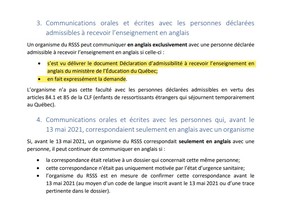Still, the Coalition Avenir Québec government will not drop contentious requirement for “historic anglophone” eligibility certificate to communicate exclusively in English in health care.

Article content
Facing an outcry from Quebec anglophones, French Language Minister Jean-François Roberge announced Wednesday he will hold a meeting with representatives of the English-speaking community to listen to their concerns about a controversial linguistic directive regulating the use of English and other mother tongues in health care.
However, Roberge’s assistant chief of staff told The Gazette the government has no intention of dropping a new requirement that the province’s “historic anglophones” produce an eligibility certificate from the Education Ministry to be allowed to communicate exclusively in English in the health sector.
Advertisement 2
Story continues below
Article content
That eligibility certificate has proved extremely difficult to obtain for some anglophone students graduating from French high schools who have been applying to English CEGEPs like Dawson College. Moreover, the certificates have not been available to an older generation of English-speaking Quebecers who depend increasingly on health care.
Hubert Laprise suggested that the clause in the directive applying to historic anglophones is “even more permissive” than for non-francophone Quebecers like allophones or English-speakers who have moved to the province from other jurisdictions. The latter groups do not have the right to exclusive communication in English under the directive, he noted.
“This expands their rights,” Laprise said of Quebec anglophones who have received the eligibility certificate to attend English schools.

Roberge’s office did not respond to a query by The Gazette later Wednesday asking why the Coalition Avenir Québec government is now imposing the bureaucratic burden on historic anglophones to obtain the eligibility certificate for health care. Until the directive was issued by the Health Ministry on July 18, no non-francophone Quebecer was required to produce an eligibility certificate to seek and receive medical services in English.
Advertisement 3
Story continues below
Article content

Mount-Royal MP Anthony Housefather expressed concern about needing an eligibility certificate in the health sector, saying the anglophone community had been led by the CAQ government to believe that would not be the case. The necessity for an eligibility certificate follows the adoption two years ago of Bill 96, the overhaul of the Charter of the French Language.
Bill 96 mandates that all government workers, including those in hospitals and nursing homes, use French “systematically” in written and oral communications with their clients, with certain exceptions, like emergencies.
Representatives from the anglophone community who have analyzed the Health Ministry directive have denounced it as confusing and potentially dangerous. Although the CAQ government maintains the goal of the directive was to clarify the exceptional situations in which English and languages other than French can be used in the health sector, critics argue it does the opposite.
“One of the greatest excesses of Bill 96 was the establishment of a general rule that access to government services in English depended on school eligibility,” Housefather posted on X. “The government then said this did not apply to health services. I call upon (Health Minister Christian Dubé) to clarify this ASAP.”
Article content
Advertisement 4
Story continues below
Article content
Advertisement 5
Story continues below
Article content
Julie Drolet, Dubé’s press attaché, did not directly address Housefather’s request. Instead, she said: “From our side (at the Health Ministry), our priority is to treat people, no matter their language. We’ll stick to that.”
Meanwhile, Roberge said he’s now willing to listen to anglo leaders who have grown anxious about the directive. Another concern is that the directive appears to take precedence over hospitals and other medical institutions that have been granted bilingual status under the Charter of the French Language. For example, Santa Cabrini Hospital — which was visited last week by an official from the French-language watchdog agency — used to have its bilingual status listed publicly by the Office Québécois de la langue française. But that is no longer the case.
“A meeting will be held shortly with representatives of the English-speaking community to hear their concerns and provide any necessary clarifications,” Roberge announced on X.
Earlier in the day, Roberge accused The Gazette of reporting inaccurately a series of articles suggesting that non-francophone Quebecers can no longer receive health or social services in a language other than French, except those who can produce an English eligibility certificate. For the record, that is not what the newspaper reported. Rather, The Gazette gave voice to concerns by anglophone representatives that the directive is confusing — a view shared by Quebec Liberal health critic André Fortin, who slammed the new language rules as “wildly unclear” on CJAD radio on Wednesday.
Advertisement 6
Story continues below
Article content
Advertisement 7
Story continues below
Article content
In a lengthy post on X, Roberge appeared to add more confusion to the directive when he stated that “with the exception of members of the historic English-speaking community, the directive provides that communications of an administrative nature or that do not compromise the health of a user must be in French.”
In fact, nowhere in the 31-page directive are there the words “communications of an administrative nature.”
Eric Maldoff, a Montreal lawyer who has studied the directive in-depth, criticized it for being densely bureaucratic and hard-to-understand.
“If Mr. Roberge has to clarify the directive, it proves that there is a problem here, because this should be absolutely crystal clear,” Maldoff said, who is also chair of the Coalition for Quality Health and Social Services.
In any case, Maldoff added, “there is no right by the government to use health and social services as a battlefield for language.”
Advertisement 8
Story continues below
Article content
Article content
Comments